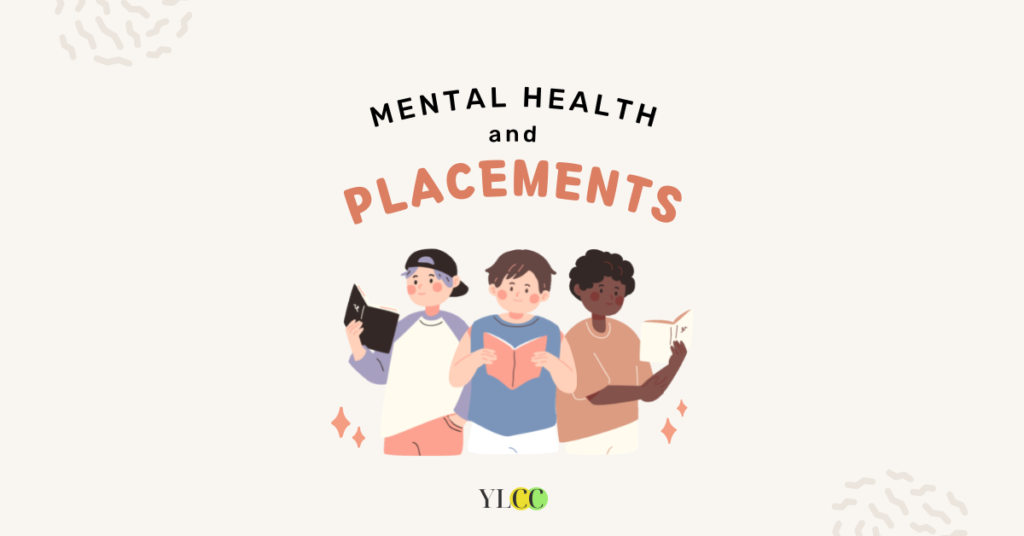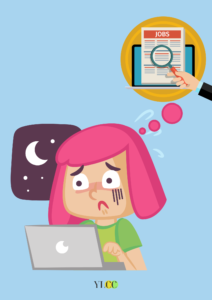
It is not uncommon to say that most law-students who are about to sit for placements or enter their penultimate or final year, experience a mixed wave of emotions which may span over a prolonged period of time. An un-ending pandemic may also impact one’s mental health in a plethora of ways. It thus becomes important to call for help during times like these. We have attempted to paint a picture of common concerns through the experience of many students who have been through the placement process.
- Uncertainty – Not knowing what will happen in the future and the possibility of not being able to overcome this uncertainty is one of the most common feelings during such times. Uncertainty not only in terms of securing a job but also being placed at an organisation that checks all the boxes on your ideal job wish list such as your preferred practice area and team, expected remuneration, preferred location, and career growth.
- Anxiety – From uncertainty stems anxiety. The thought of what would happen in the future along with the burden of expectations that is put on oneself often leads to the strong feeling of anxiety that severely affects our mental well-being..
- Fear of Failure – Most of us have been a victim of checking the annual placement brochure of the law school we choose to enroll ourselves with. The most common goal during these times is to be amongst those students who secure good placements. As the time for the interviews comes near, the fear of failing weighs harder than any other factor. The feeling of not being able to perform to the best of your ability and the fear of losing out on ‘THE’ opportunity in a competitive environment immensely affects confidence and self-esteem.
- Lack of Confidence – Often, our mind prioritises competitors and running the rat race to the extent that we lose sight of our own capabilities. This may lead to insecurity and inferiority to our competitors resulting in blindsiding our own potential. We should set our own targets and continue to improve ourselves instead of engaging in petty comparison.
- Procrastination – Procrastination in preparing for an interview or an assessment internship can spell disaster for the overall outcome. One may also recognise the procrastination and the frustration arising out of not being able to feel productive and do what is required for the upcoming interviews. It is important to stay proactive and motivated during these times.
- Burnt Out – Placements season often implies hectic schedules and pulling all-nighters. Needless to say, fatigue and exhaustion is bound to set in. This can lead to a situation where we may often want to ‘just get done with it’ and not find the strength within ourselves to go the extra mile while preparing.

These are some of the challenges one may face while gearing up for placements. However, realising what you are feeling and being able to manage them effectively will be key in helping you stay healthy throughout the placement season. Some of the options that you may explore are –
- How to Combat Failure? – From a law-student who recently failed to convert a Tier – 1 Law Firm PPO interview into a job position, she says, “What really matters is what is in your control at the end of the day. If it was something under your control and you could have done better, that is the learning you gain and you can use that the next time you sit for an interview. Remember you are not back to where you were when you started, you are ‘1’ interview old and that experience counts. Maybe that experience will help you do better the second time. However, what is not in your control is the mood of the interviewer, the kind of questions that are being posed to you, the vacancies and such other factors. So don’t be harsh on yourself.”
- Does Sharing Help? – Sharing what may be weighing heavily on you with your close ones may also help in understanding a neutral perspective and feeling better about a situation where the odds are against you.
- Should I TakeThat Break? – If you feel worn out, afford yourself some break time and do whatever you feel calms you down. You can try going for a run or a walk to ease your mind, pursue your favourite hobby or maybe pick up an activity you have always been wanting to do. Be kind to yourself and take a break that you feel is best suited to you. At the same time, set a timeline for yourself so that you do not lose sight of the main goal you seek to achieve. You can also divide your work into small segments everyday so that you don’t get overwhelmed at the 11th hour.
- How to Work through Anxiety? – Dimple Kishnani, founder of Mindworks Counselling Services and a practising psychologist from Pune says, “Anxiety and feeling nervous is common due to fear of uncertainty and it adds up if your self-talk is negative. Focusing on self-talk in your mind is important. Avoid comparing yourself to your seniors and colleagues or their journey. Instead, work to identify your strengths and how you could effectively communicate them. Square breathing or grounding techniques are often found to be beneficial to calm your thoughts before and after the interview to avoid stumbling, quick 2-3 cycles will help you on your way in the interview.”
- Therapy – Therapy is definitely a safe place to share your concerns with a certified professional who will be able to share techniques with you to assist you to deal with the situation better and in a personalised manner. For those who are considering seeking therapy, the most common hurdle as a student is the expenditure. Many therapists and clinics offer a ‘sliding scale’ which means if you are a student or in a situation where you cannot afford therapy, they provide free of cost services or services at a cheaper rate than their usual charges. However, before availing services from any therapist it is recommended that you go through their website and understand their code of ethics and confidentiality protection to suit yourself. Essentially, due diligence about a potential therapist is a must from your end.
In conclusion, it can be reiterated that placement season is undoubtedly one of the most intellectually demanding time in a student’s life. There is a need to analyse and select the correct approach that yields outcomes not only on the professional front but also pushes us to preserve our mental well-being. A good strategy will aid us to be at our productive best without stressing ourselves out. It is to be acknowledged that the mental health issues of a candidate reflects on his or her performance, and this makes it imperative to maintain a balance.
YLCC would like to thank Swati Shekar for her valuable inputs in this article.






